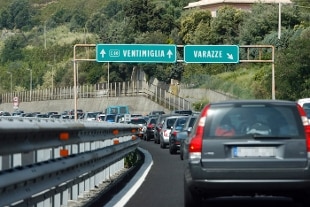- Broken Ligurian highways, Toti announces ordinance
Share
June 29, 2020 "Sorry I was late, I was on the phone arguing with the CEO of Autostrade and so on." So the president of the Liguria Region, Giovanni Toti, opening the press conference in Genoa on the theme 'Coronavirus: measures of economic support to businesses and families in the emergency and in the restart phase'. It was probable that the topic of discussion concerned traffic queues and blockages also due to the construction sites that have affected the connecting roads of the Ligurian region in the last few days.Rixi: "Measure is full, precise answers are needed"
"We arrived at the end of June, the deadline by which Aspi had assured in the time trial program presented to local authorities that the work on the Ligurian network would be completed. Instead, Liguria is still isolated, a prisoner of construction sites, with endless queues, accidents, incalculable inconvenience for Ligurians and tourists. Thanks to Aspie Mit, the lockdown for Liguria continues with enormous damage to the local economy, the country's first port and tourism. The measure is full: precise and no longer delayable answers are needed, without blackmail on security. If they do not arrive, I hope for a mobilization of all the mayors of Liguria, beyond the political sides, to make the voice of the Ligurians heard in Rome ". This was stated by the deputy of the League and infrastructure manager Edoardo Rixi.
MIT: "No at the closure of the A26 and faster checks of the tunnels" Faster checks
on the safety status of the tunnels, also through non-invasive techniques, no closure of the A26 and first openings starting from 3 July. These are the actions shared by the Ministry of Infrastructure and Transport with the concessionaire Autostrade per l'Italia, during the meeting held yesterday, to optimize the actions to mitigate the inconvenience to road traffic caused by the checks underway in Liguria. Aspi has confirmed its commitment to complete the verification activities that concern a total of 147 tunnels by 10 July. At the same time, indirect inspections will be carried out for non-inspected tunnels which will enable knowledge of the safety status to be acquired, guaranteeing the transit of vehicular traffic. Furthermore, this method of investigation will not make it necessary to close the A26 motorway, which will only be interrupted at night. A modality that is more responsive to the mobility needs of the Liguria Region.
Aiscat: "Liguria unique case in Italy"
Aiscat asked an urgent meeting to the Ministry of Infrastructures and Transports to have clarifications regarding the situation of the Ligurian roads. The regulatory changes introduced by MIT last major in relation to the planning and methods of carrying out tunnel inspections, without any consequent adjustment of the timing of the interventions, are generating a concentration of construction sites that causes significant inconvenience to traffic and users. You can read it in an Aiscat note.
It should be noted that the new procedure recently launched by MIT significantly exceeds the generic requirements of the Circular of '67 in terms of precision and method of investigation and also for this reason it has been positively accepted by the whole sector. However, it is unthinkable that MIT could continue to impose the two methods in parallel, irreconcilable in terms of timing and consequent impact in the number and intensity of construction sites needed. This choice is even more incomprehensible if we consider that no one has clarified whether the timing for the interventions indicated by MIT are valid only and exclusively for some territorial areas, such as the Ligurian one, or for the whole national territory. In fact, while on 1 June the Ministry released the new Guidelines for tunnel inspections to all national concessionaires, starting a process of active technical comparison, some companies have already been set precise deadlines for the conclusion of the inspections, thus creating an objective discrepancy. It is a choice whose motivations cannot be understood.
Since network surveillance is a strategic and fundamental activity for the safety of infrastructures and users, it is absolutely necessary that it be carried out through effectively achievable planning and certain and sustainable timescales, applying clear rules for all. Otherwise, the managers do not intend to assume any responsibility for the inconvenience that could derive from the users from forced and unclear choices, as well as imposed without notice.

